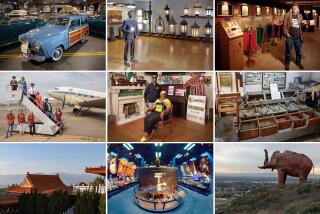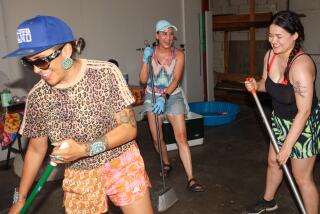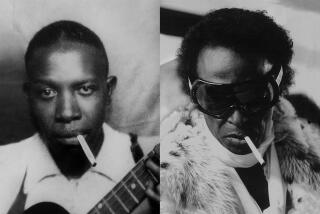Autry chooses Native American
- Share via
The Autry National Center of the American West took a step this week that underscores its oft-stated mission to tell the whole story of the West: Marshall McKay, chairman of the Yocha Dehe Wintun Nation in Northern California will chair its board of trustees for the next two years, the first Native American to hold the top board post in the museum’s 22-year history.
“It’s a double honor to have this bestowed on me,” said McKay. “To come into this position is outstanding for a Native American. One of my goals as chairman is to bring those perceptions along, so it’s not just a ‘cowboy museum,’ but a museum of the American West.”
McKay, 58, is in the saddle at a crucial moment for the Autry. It’s in the design stages of renovating a large warehouse in Burbank as a research center and a storehouse and curatorial workshop for the bulk of its 500,000-object collection. When that project is done, the Griffith Park museum will be remodeled to carve out 25,000 square feet of exhibition space for the prized collection of Native American art and artifacts the Autry acquired in 2003 when it absorbed the financially teetering Southwest Museum.
The Burbank and Griffith Park renovations have an estimated $75-million combined price tag and a planned completion date of 2013.
McKay’s experience in tribal government and administration and his longstanding interest in Native American art and culture parallel the experience of the Autry’s new president and chief executive, Daniel Finley, who started in September after a career in Wisconsin local government, followed by a tenure as director of the Milwaukee Public Museum.
“He’s new, I’m new. We’ve sort of bundled that newness and vowed together to put the Autry on the map,” McKay said by telephone.
Jackie Autry, who co-founded the museum with her husband, cowboy star Gene Autry, and remains its leading benefactor, said Friday that although McKay is not the first Native American to serve on the Autry’s board, his rise to the top spot carries symbolic value. From the start, she said, “I certainly dreamed it would happen, because in telling the history of the West, so much is related to our Native American community.”
But, Autry said, “he has wonderful leadership and administrative skills, and he knows the Native American collection we house and can probably articulate about that better than anybody else.”
McKay said when he was first sounded out about taking the Autry chairmanship, he had to weigh the other responsibilities in his life. The Yocha Dehe have had a major expansion of their Cache Creek Casino Resort in Brooks, Calif., about 40 miles northwest of Sacramento, in the works, but recently shelved it until the economy improves.
But the 65-member tribe, who each receive at least $1 million a year in casino revenues, according to a 2008 report by the Sacramento Bee, is also the main financial backer of a controversial plan to build a $1-billion casino and resort beside San Francisco Bay in Richmond. McKay said the sponsoring tribe, the Guidiville Band of Pomo Indians, must secure the required government permits, and his role wouldn’t grow until it’s ready to be built.
He also says there should be no problem of divided loyalty when it comes to his double museum affiliations. Last year he joined the board of the Smithsonian’s National Museum of the American Indian in Washington, D.C.
“Yes, there might be some competition” for donors between the two museums, McKay said, “but we are 3,000 miles apart and have specific audiences.”
In 2007, the year before he joined the Autry’s board, McKay became a founding member of the Native Arts and Cultures Foundation, to which the Yocha Dehe have pledged $1.5 million as a challenge grant to raise matching contributions toward creating a grantmaking fund for Native American art and culture..
“I am so fascinated by art, and how art tells the story of any peoples,” McKay said. “Certainly with native tribes in California I’ve been an advocate for expansion of both contemporary art and traditional art.”
Among his hopes as Autry chairman, he said, will be involving Native Americans in the museum to the point where some will be inspired to seek careers at the Autry as curators and in other staff jobs. An Autry spokeswoman, Yadhira De Leon, said Thursday that though it doesn’t keep track of the ethnicities of its 165 employees, there have been Native Americans on its staff throughout her seven years at the museum.
McKay was the first member of the Yocha Dehe to attend college, at Sonoma State University. He spent 15-years repairing and maintaining nuclear submarines for the Department of Defense, then supervising those work crews. He got involved in tribal government in 1986, three years after California tribes won approval to run gambling operations, and has helped guide the Yocha Dehe casino interests since then, as well as taking a leadership role in Indian gambling statewide.
Yocha Dehe is the traditional tribal name of the group previously known as the Rumsey Band of Wintun Indians. The old name, first coined by the U.S. Bureau of Indian Affairs, was discarded by the tribe last year.
--
More to Read
The biggest entertainment stories
Get our big stories about Hollywood, film, television, music, arts, culture and more right in your inbox as soon as they publish.
You may occasionally receive promotional content from the Los Angeles Times.











